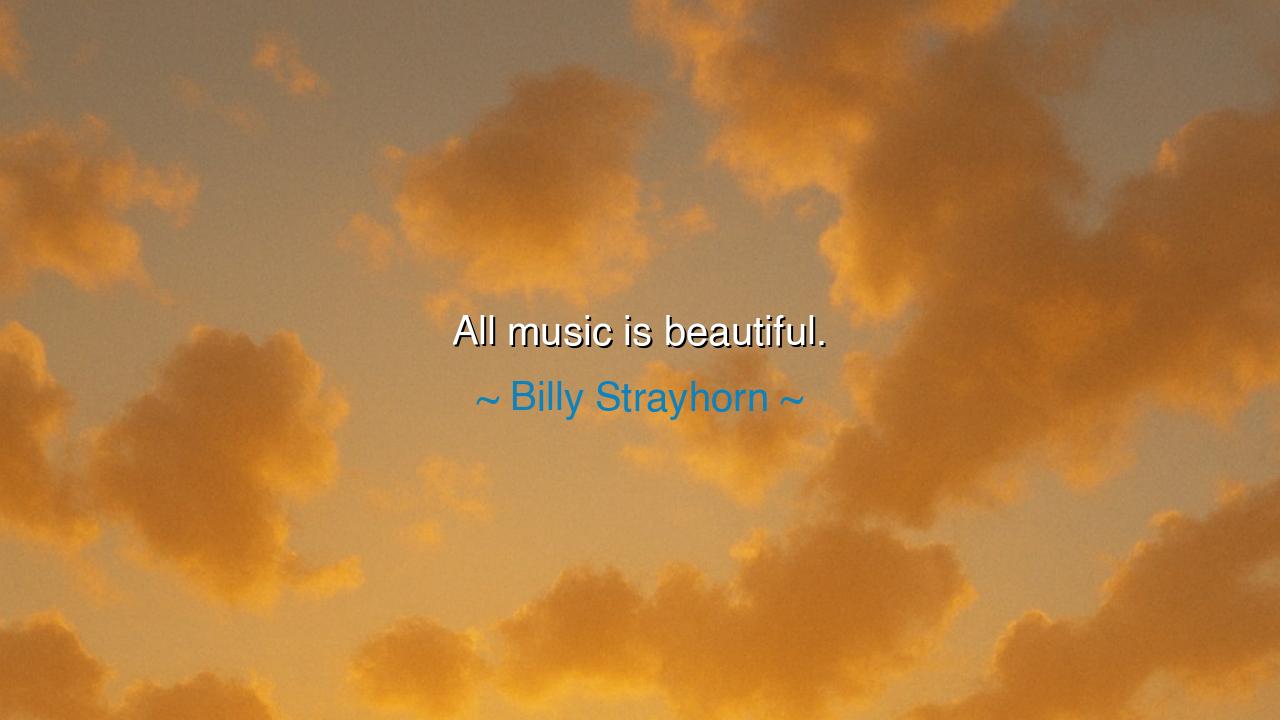
All music is beautiful.






The words of Billy Strayhorn, “All music is beautiful,” are as simple as they are profound. Here, in this declaration, lies a truth as radiant as the sun: that every expression of the human spirit, poured into rhythm and melody, carries within it a spark of beauty. Strayhorn, the great composer and partner to Duke Ellington, knew well the struggles of his own life—his quiet battles against prejudice, his health, his solitude. And yet, even from his vantage point of hardship, he saw the world of sound as unified in wonder. For to him, music was not divided by rank or genre, not to be judged by fashion or fame, but honored in its essence, for every note is born of a soul.
The origin of this wisdom comes from a man who lived deeply in the heart of jazz, but who respected every form of song. Strayhorn wrote masterpieces such as Lush Life and collaborated on timeless works, yet he never limited beauty to his own craft. He knew that music in its many shapes—be it the chant of monks in dim cathedrals, the cries of the blues, the precision of the symphony, or the hum of a lullaby—was all worthy of reverence. To say “all music is beautiful” is to acknowledge that behind every song stands a human being, yearning to express what words cannot contain.
History bears witness to this truth. When Antonín Dvořák came to America in the nineteenth century, he heard the songs of Black spirituals and Native chants. Many dismissed them as lowly or primitive. But Dvořák proclaimed them to be the very foundation of America’s greatest music. He saw beauty where others, clouded by prejudice, did not. In his New World Symphony, he wove those melodies into grandeur, revealing to the world that all music—no matter its origin—holds beauty if only we have ears to hear.
The ancients also knew this. In Greece, the philosopher Plato spoke of the “music of the spheres,” the belief that the universe itself resounds with harmony. In every rustling tree, in the song of birds, in the murmur of rivers, there is music—and therefore beauty. Even when dissonant, even when strange, music reflects life itself: at times smooth, at times jagged, yet always carrying meaning. Strayhorn’s words echo this timeless wisdom: nothing born of sincere expression is without beauty.
To believe that all music is beautiful is to adopt a spirit of humility and openness. It means we set aside judgment, that we do not close our hearts when a song is unfamiliar or foreign. It is to recognize that every culture, every people, every age has found its own way to weave beauty into sound. And in listening, we are drawn closer not only to the music, but to each other. For to honor the music of others is to honor their humanity.
The lesson for us is clear: cultivate ears that seek beauty in all things. When you hear a song you do not understand, do not dismiss it; instead, ask what truth or longing lies behind it. When you encounter dissonance, search for the hidden harmony. Let your life itself become like an ear, attuned to the voices of others, perceiving the beauty even in what seems strange. In this way, you will not only become a better listener of music, but also of people.
Practically, you may begin by listening broadly. Explore songs from other cultures, other times, other traditions. Learn to hear the depth in them, even if they are not to your taste. Sing when you can, for in raising your own voice you learn the courage behind every song. Above all, remember that each person you meet carries their own music within them—unique, unrepeatable, beautiful. Approach them as you would approach a melody: with reverence, with curiosity, with openness.
Thus, hold fast to Strayhorn’s truth: “All music is beautiful.” For in honoring all music, we honor all life. And when we train ourselves to hear beauty everywhere, we will find that our own lives become a song—woven of many voices, rich in harmony, and filled with the quiet majesty of the eternal.






AAdministratorAdministrator
Welcome, honored guests. Please leave a comment, we will respond soon